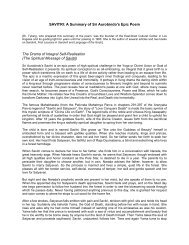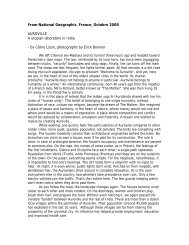Invocation 08 - Auroville
Invocation 08 - Auroville
Invocation 08 - Auroville
You also want an ePaper? Increase the reach of your titles
YUMPU automatically turns print PDFs into web optimized ePapers that Google loves.
So this is the most significant aspect of this line of development, man's<br />
life vis-a-vis death, which comes to the forefront in the episode of Savitri.<br />
So far as the soul's immortality is concerned, the Indian concept may have<br />
its parallels elsewhere also, for example in Greek mythology, where we find<br />
the story of Alcestis and Admetas. Admetas is destined to die, but again the<br />
occult guardians yield to a compromise: if someone else is prepared to die<br />
for Admetas, then he would continue to live. No one is prepared to do that<br />
but Alcestis, his wife. She comes forward and dies in his place. Hercules,<br />
the great hero, on one of his many great missions, comes to their palace.<br />
Now according to Greek tradition, if a death has taken place recently the<br />
guest should not be informed about it; the guest should be treated as if<br />
nothing had happened; all the attention must go to the guest. It should not be<br />
revealed to him that some tragic incident had preceded his arrival at home.<br />
So he is not told that Alcestis, his would-be hostess, is no more. But as he is<br />
departing from the palace he comes to know about it. He rushes and catches<br />
hold of the carrier of the soul of Alcestis and forces him to surrender the<br />
soul back to the body of Alcestis, which is still lying there. Here again, as in<br />
the tale of Ruru and Pramodvara, there is also a kind of sacrifice that Alcestis<br />
makes for the sake of her husband's life.<br />
Then I am sure you all know the legend of the Sphinx, one of the most<br />
significant of Greek myths. You see, many of mankind's early myths and<br />
legends are lost to us. Most of the Hebrew ones, apart from those preserved<br />
in the Old Testament, are lost. But between these two great treasuries of<br />
myths, the Indian and the Greek, we sometimes come across wonderful<br />
meeting points. One wonders if some of the followers of the rishis had<br />
migrated there or I don't know how it happened. Now the Sphinx episode is<br />
such a magnificent myth! Along the lonely road, on the hilltop, lives a strange<br />
creature, with a woman's face, the body of a lion, the paws of a dog and a<br />
serpent for its tail. And whoever happens to pass by is stopped by this<br />
Sphinx and asked a question: "What is the creature who walks in the morning<br />
on four legs, as the day grows on two legs and in the evening on three legs?"<br />
You must answer it. If you cannot answer it by sundown, you will lose your<br />
life. However wise a traveller may be, however he may scratch his head, he<br />
will never come across the answer to the question: "What is the creature<br />
who walks in the morning on four legs, as the day grows on two legs and in<br />
the evening on three legs?" And by sundown, whoever has failed to answer<br />
28
















